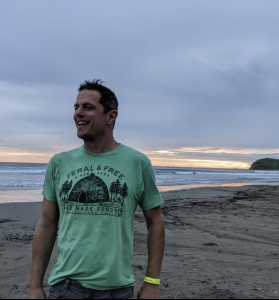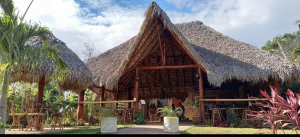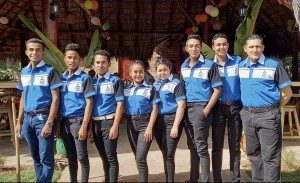CSUN Nazarian College Alum Uses Entrepreneurial Skills to Give Back to His New Community in Nicaragua

Jeffrey Landi.
A few years ago, Jeffrey Landi ’93 (Finance) got an itch to do something different, something bold. His two kids were reaching adulthood, and he started dreaming beyond his home in Los Gatos, Calif. He thought of his future, of finding a new place where he could make a difference.
That place ultimately was a small town in Nicaragua, San Juan del Sur. It wasn’t long before he bought property, built a house and then started two businesses. (Landi splits his time between San Juan and Los Gatos, where his family still lives full time.)
“I started as a tourist, really,” Landi said. “I’m a big traveler, I’ve been to 37 countries, and Nicaragua was on my list. A work colleague connected me with a woman involved in real estate in San Juan. On my first vacation, I visited three places, looking at them with an intention to buy.”
San Juan checked his boxes: “Beach town — I’m obsessed with the ocean — and a strong expat community.” And he connected with local businesswoman Maria Aburto. “Maria suggested some great projects, including one she was involved with — El Encanto del Sur. I just had a strong hunch that San Juan was the place. And that hunch was spot on.”
San Juan became much more than a vacation spot for Landi. “As soon as the house was completed, I came on a trip with my father, and shortly after that, while I was by no means settled, I felt like I’d seen enough here to start getting an idea of how I could give back, what might be needed here.
“I realized that if I was going to be an expat here, no way was I going to shield myself and just enjoy the culture, drive the roads, eat the food and surf the waves,” he said. So, working with Aburto, who runs the TreeCasa Resort just behind Landi’s house — “She’s a pillar of this community,” he said — he looked at ways he could give back to the community.
They landed on healthcare, specifically dental care. “Maria connected me with the local hospital, which is run by the Ministry of Health (MINSA), the government, as part of the Nicaraguan universal healthcare system,” Landi said. “I asked them, ‘What are the biggest challenges to serving your community?’ And without hesitation they answered, ‘Oral health, particularly in remote barrios.’ So, we got to work creating an oral health program we could take on the road.” And MINSA agreed to partner with Landi.
“Jeff fell in love with Nicaragua and San Juan,” said Aburto, “and my business partner, Will Pattison, and I were able to connect him with MINSA. He wanted to know where the most need was; of course, that area, oral health, was also the most expensive!”
The program brings basic procedures — cleaning, fillings, extractions — to thousands of people, and helps them connect with and afford private dentists when advanced measures are required. Another key component of the program is education through its school visits.
The launch of Sonrisas Felices — which means “happy smiles” — took place in mid-2020, which posed more than a few obstacles due to the COVID-19 pandemic, but Landi purchased what they’d need for a mobile dental unit: basic dental equipment, a dental chair and other furnishings.
Diversifying His Ventures
Landi is involved in multiple projects and ventures in San Juan — he’s a busy guy. He launched a second project in 2022: a restaurant, Nicafé, which includes a plant nursery, Plantafé. But Nicafé is not an ordinary restaurant. It is staffed almost completely by people who are deaf.
The idea was brought to Landi by friend and fellow expat Katie Brugger. “I knew a young man, who is deaf, and he was about to graduate from high school in December 2021,” she said. “But he had no idea what he could do once he graduated. The jobs are very scarce [in Nicaragua], and with a disability, even more so.”

The Nicafé building.
A friend of Brugger’s had purchased a restaurant that he tried to open in 2018, just before intense sociopolitical protests began in Nicaragua. “All the tourists and expats left, so he couldn’t. It’s a beautiful building, what they call ‘rancho’ style, thatched roof and open air, about 30 minutes out of town.” When Brugger looked at the property, it had been sitting vacant for three years. She was able to gather investors, including Landi, to start up the restaurant again.
“I got this idea that we could bring these two things together: Revive the restaurant and provide work for Deaf kids who had graduated from high school and college,” Brugger said. “We got kids who have been together at the Deaf school in (Nicaragua’s capital) Managua all their lives. They’re like family.”
One unexpected delight: Nicafé customers started learning simple Nicaraguan Sign Language, along with the hearing staff. NSL has the distinction of being the only language created without the influence of other languages and recorded from its inception. It was created amid the Sandinistas’ literacy revolution (the Sandinista National Liberation Front was a Nicaraguan resistance group that established a revolutionary government in 1979), when large numbers of Deaf students were brought together, and the students developed a way to communicate with one another.
The head chef at Nicafé is Edwin Lacayo, who is not hearing impaired but was game to learn sign language. Lacayo had to learn the signs for kitchen terms and ingredients fast.

Nicafé staff.
“I learned 10 signs the first day,” he said. The biggest challenge was that the kitchen staff had never worked in a restaurant. Now, all of the staff members (in their mid-20s) have developed the skills to produce high-quality dishes, he said. “My biggest reward is seeing them successfully serve clients on my days off,” Lacayo added.
The opportunity to learn skills is an enormous benefit to the staff. Adrian Maltez, who is deaf, was hired to work in the nursery, but it was clear to him that he really wanted to learn to cook. “I saw the other Deaf staff learning how to make coffees, and I really wanted to be part of that,” said Maltez. “I knew there would be more opportunities for learning in the kitchen.” He is learning how to be a restaurant chef, “how to combine different ingredients to make good flavors,” and hopes to work in other restaurants, too, someday.
“That Business Spark”
Landi grew up in New York. Born in Queens, he moved with his family to Garden City, about 25 miles outside Manhattan. “My parents divorced when I was 12,” said Landi, “and my dad moved to Marina del Rey, California. As I was finishing high school, I visited a few times, and it was an exciting place to be in the ’80s.” So, the idea of a California state school came up. “Northridge was close to my father, and we knew it was a good, affordable school, and we had close family friends in Reseda and Chatsworth. It was a great idea.”
While he attended the CSUN David Nazarian College of Business and Economics as an undergrad and got his B.S. in finance (“I just loved Wall Street and The Wall Street Journal, so I caught that business spark,” he said), his diverse college experience set him on a successful career path.
After graduation, Landi spent a few years in marketing and then in tech, ultimately landing at Adobe. “I had a 25-year career in tech,” he said, “and while that was important to providing for my family, ultimately it felt pretty meaningless to the world. I’m at a place now where I’m seeking more depth in my life, my relationships and friendships, and the work I do.” His daughter, Kaiya, is 17 and a senior in high school, and his son, Nate, 20, attends Western Washington University. “Kaiya did a project in her junior year to drive funds to Sonrisas Felices.”
This phase of his life is gratifying, Landi said, and the businesses are thriving. “We had an amazing first-year anniversary celebration of Nicafé and Plantafé on Jan. 15, 2023. I’ve found the people and my Nica partners to be beautiful, honest and authentic.
“There is always something you can do to help and have an impact,” he said. “Beach cleanups don’t cost anything, mentoring kids doesn’t cost you anything, but I think it’s important to give back.”

 experience
experience